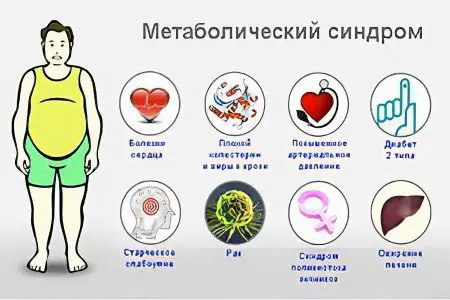
Metabolic syndrome – this is a combination of hormonal and metabolic pathologies, such as: obesity in the abdominal-visceral type, disorders of carbohydrate and lipid metabolism, arterial hypertension, respiratory disorders during night sleep. All these diseases are closely related to each other, and it is their combination that determines the presence of metabolic syndrome in humans. This complex of pathologies poses a threat to human life, so experts call it the deadly quartet.
The disease is widespread among the adult population, so much so that the metabolic syndrome can be compared to an epidemic. According to various sources, 20-30% of people in the age range from 20 to 49 years suffer from it. In this age range, metabolic syndrome is most often diagnosed in men. After 50 years, the number of patients among men and women becomes the same. At the same time, there is evidence that people with obesity become 10% more every 10 years.
This syndrome adversely affects the progression of cardiovascular diseases that are associated with atherosclerosis. The syndrome also increases the risk of developing coronary complications, which leads to the death of patients. If a person in addition to this suffers from obesity, then the likelihood of developing arterial hypertension in him increases by 50% or more.
Although not a single Russian conference of a therapeutic profile is complete without a discussion of the metabolic syndrome, in practice, patients are faced with the fact that they often do not receive adequate therapy for their condition. According to the data provided by the State Research Center for Preventive Medicine, only 20% of patients are provided with the necessary antihypertensive care, while only 10% of patients receive adequate lipid-lowering treatment.
Causes of the metabolic syndrome
The main causes of the metabolic syndrome are considered to be the patient’s predisposition to insulin resistance, excessive fat intake, and lack of physical activity.
The main role in the development of the syndrome belongs to insulin resistance. This hormone in the human body is responsible for many important functions, but its basic purpose is to bind to receptors that are sensitive to it, which are present in the membrane of each cell. After adequate communication, the process of transporting glucose into the cell begins to function. Insulin is needed in order to open these “entrance gates” for glucose. However, when the receptors remain insensitive to insulin, glucose cannot enter the cell and accumulates in the blood. Insulin itself also accumulates in the bloodstream.
So, the causes of the development of metabolic syndrome are:
predisposition to insulin resistance
Some people have this predisposition from birth.
Gene mutations on chromosome 19 lead to the following problems:
Cells will not have enough receptors that are sensitive to insulin;
There may be enough receptors, but they lack insulin sensitivity, resulting in glucose and food being deposited in adipose tissue;
The human immune system can produce antibodies that block insulin-sensitive receptors;
Abnormal insulin will be produced by the pancreas against the background of depletion of the apparatus of the organ responsible for the production of beta protein.
There are about 50 gene mutations that can lead to insulin resistance. Scientists are of the opinion that human insulin sensitivity has become lower as a result of evolution, which made it possible for his body to safely endure temporary hunger. It is known that ancient people often experienced food shortages. In today’s world, everything has changed dramatically. As a result of excessive intake of foods rich in fats and kilocalories, visceral fat accumulates and metabolic syndrome develops. After all, a modern person, as a rule, does not experience a lack of food, and he consumes mainly fatty foods.
[Video] Dr. Berg – Monitor Insulin for Metabolic Syndrome. Why is it so important?









